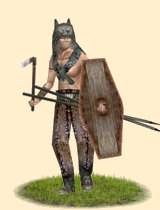Worgōzez (Wild Mercenary Infantry)
 |
Weapons | Defence | Mental | ||||||
|---|---|---|---|---|---|---|---|---|---|
| Primary | Secondary | Armour: | 2 | Morale: | 16 | ||||
| Type: | spear | axe | Shield: | 3 | Discipline: | impetuous | |||
| Attack: | 8 | 12 | Skill: | 15 | Training: | untrained | |||
| Charge: | 10 | 10 | Recruitment | Other | |||||
| Lethality: | 1 | 0.165 | Soldiers: | 30 | Hit Points: | 1 | |||
| Range: | 31.5 | 0 | Cost: | 2633 | Mass: | 1.15 | |||
| Ammo: | 2 | 0 | Upkeep: | 658 | |||||
| Turns: | 1 | ||||||||

Wild Mercenary Infantry are predatory Indo-European warriors who are "Wolves" or "Outlaws" from regular society, sometimes by choice, and oftentimes young men seeking to prove themselves in accordance to extremely ancient customs.
Impetuous
Hardy
Expert at Hiding in Woods
Worġōzez
(WOR-ghō-zez, "Those who deserve Strangulation”)
The forests of Germania, dense and expansive are home to all sorts of wild and dangerous beasts, including those of the human variety. Wargōzez, whose name can also mean "Wolves," or "Outlaws" are predatory Indo-European warriors who are outcasts from regular society sometimes as exiles and criminals, sometimes by choice, and oftentimes young men seeking to prove themselves in accordance to extremely ancient customs. These men live deep within the woods that shield and blanket Germania, an ideal enviroment for hiding and preserving all sorts of ancient traditions, untainted by external forces and influences now becoming more and more commonplace in Germania via trade and military expansion. They fend for themselves in this harsh and unforgiving enviroment much in the same way as the wild beasts, so feared and respected they are sometimes emulated throughout Germania and indeed Europe as a whole.
They use equipment and tools that will understandably become more and more makeshift as time goes on as the more common utensils from societies left behind begin to fade, wear and break. These men look after themselves, living out a true and ancient ideal of self sufficency and independance seen throughout the Ancient world and likely drawing its origins from a Proto-IndoEuropean tradition and possibly even prehistoric, pre-IndoEuropean traditions.
Living in small groups made up of individuals from all over the class spectrum, for all sorts of reasons, these young men will have spent many years surviving in the wilderness and will have as a consequence become very vicious, efficient and arguably quite mentally ill due to their isolation from regular society. What sets these men apart from other wild men who undoubtably existed in Europe for a very long time, is their use of wolf symbolism.
The wolf is a proud, vicious and cunning pack hunter animal, an expert at survival, whose striking aesthetic and haunting howls will have understandably captured the imagination of man since the moment they encountered the beast for the first time. So it is no surprise that over time perhaps through superstition, perhaps through an understanding of the power of psychology on the battlefield or perhaps for simple camoflage and practicality, that men would don the skins of wolves and attempt to emulate these fierce beasts on the battlefield, altering their aesthetic and also their mental state to give themselves an edge in combat.These packs of man-wolves are outrageously vicious and aggressive in combat, stalking their prey through the trees and tall grass before choosing to make their attack, howling and roaring as they make their presence known on the battlefield. They swiftly charge towards their enemies with their weapons trained on their opponents faces, necks and limbs, perhaps after hurling a devestating volley of javelins whose accuracy will have become impeccable from years of hunting to survive. After combat the more peculiar and perhaps disturbing habits of these men can be witnessed in the drinking of the blood of enemies, perhaps even their own blood, possibly cannibalism, self mutilation, and of course: howling.
It is not surprising to learn that these very ancient style warriors will have gained the attention and respect of wealthy Germanic lords, and later on Roman Emperors (such as Trajan) who would seek to hire and use these men to fight their enemies and expand their territories.
Of course, it comes at a price, such individualisitc warriors will not work for just anyone, they will expect good pay and one will have to venture deep into the forests of Germania to find them, risking ambushes from all sorts of potential enemies as one travels, however, once located and hired, these terrifying mercenaries could be exactly what an ambitious Emperor, King or Warlord requires in order to successfully expand his or her borders or defeat his or her foes.